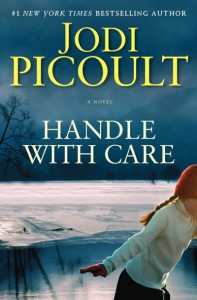HANDLE WITH CARE by Jodi Picoult
By Lee Peoples | July 17th, 2010 | Category: Book Reviews, Fiction | Comments Off on HANDLE WITH CARE by Jodi Picoult Jodi Picoult’s novels are about topics of concern today: family, relationships, and love. My Sister’s Keeper (2004) addressed the topic of bone marrow transplants and children being conceived and born for the express purpose of one child saving another. Change of Heart (2008) addressed the issue of organ donations made by criminals, in this case whether or not a young man convicted of child molestation and double murder has the right to donate his heart upon execution to the sister of the little girl he is accused of sexually abusing and murdering. Nineteen Minutes (2007) addressed the issue of the effects of bullying on the known victims and the murderer in a Columbine-style killing spree when the killer had been driven to the limits of his endurance.
Jodi Picoult’s novels are about topics of concern today: family, relationships, and love. My Sister’s Keeper (2004) addressed the topic of bone marrow transplants and children being conceived and born for the express purpose of one child saving another. Change of Heart (2008) addressed the issue of organ donations made by criminals, in this case whether or not a young man convicted of child molestation and double murder has the right to donate his heart upon execution to the sister of the little girl he is accused of sexually abusing and murdering. Nineteen Minutes (2007) addressed the issue of the effects of bullying on the known victims and the murderer in a Columbine-style killing spree when the killer had been driven to the limits of his endurance.
Handle with Care, Jodi Picoult’s 2009 bestseller, is the heart-wrenching story of a family’s attempt to survive when their second child, Willow, is born with OI, osteogenesis imperfecta, a collagen defect that causes bones so brittle they might break with a stumble, a twist, a sneeze. The story is set in a small town in New Hampshire, where the family of four lives. The father, Sean, is a policeman; the mother, Charlotte, is a former pastry chef who now spends her time taking care of their two daughters, Amelia, a pre-teen and Sean’s adopted daughter, and five-year-old Willow.
We’re all quite familiar with wrongful death lawsuits, but what about wrongful birth? Charlotte O’Keefe, the main character, in an attempt to provide the best for Willow, whose medical expenses are wreaking a financial hardship on the family, files a wrongful birth suit against Piper, her OB doctor—and by the way, her best friend. The suit purports that had the diagnosis of osteogenesis imperfecta been made at the first prenatal ultrasound, Charlotte would have been given the choice of aborting the fetus at eighteen weeks. Instead, the suit contends, Piper, the obstetrician, was negligent in that she did not inform Charlotte of the baby’s condition in time to give her the choice of terminating the pregnancy. The diagnosis was not made until the ultrasound at twenty-seven weeks revealed seven broken bones, too late for Charlotte and Sean to even think of abortion. Four more bones got broken during delivery.
Willow is five years old when during a long-anticipated vacation to Disney World she ends up in the hospital there in Florida; and the father, Sean O’Keefe, attempts to file a lawsuit, only to be told he did not have a case. When told about the possible success of wrongful birth suit, he adamantly refuses, considering such a lawsuit inhumane. Because Charlotte sees this as a way to provide for her child, she pursues the case even though it puts her marriage and her family at risk. Sean files for divorce; Amelia, their older daughter, suffering from a lack of attention, ends up with serious personal problems. Piper is unable to return to her medical practice, and her marriage to Rob, an orthodontist, suffers as well. Marin, Charlotte’s lawyer, has her own personal problems; and while she disagrees with Charlotte in principle, works diligently to win her case for her.
Charlotte, alone in her pursuit of this lawsuit, often turns to her former career as a pastry chef for solace. Much like Laura Esquivel in her novel, Like Water for Chocolate, the author includes recipes that her main character uses to deal with her troubles. “The more my hands moved,” Charlotte says, “the less likely I was to let my mind wander.” When later she returns to her career and her new business partner tells her, “There’s a certain something in your cooking that’s like nothing I’ve ever tasted,” I wondered if that special ingredient like in Like Water for Chocolate was tears. No. “It’s regret,” says Charlotte.
Handle with Care’s plot, conflict, characters . . . will keep you guessing right to the end while touching you deeply and at the same time entertaining you. You will be caught up in a love/hate relationship with the mother who dares to risk all with her lawsuit. It is a great read, well written and as with all of Picoult’s novels, well researched. You see Willow as a loving, precocious child, and often you must remind yourself of her terrible disability. Often you will find yourself on the edge of your seat or holding your breath for fear she might break another bone.








